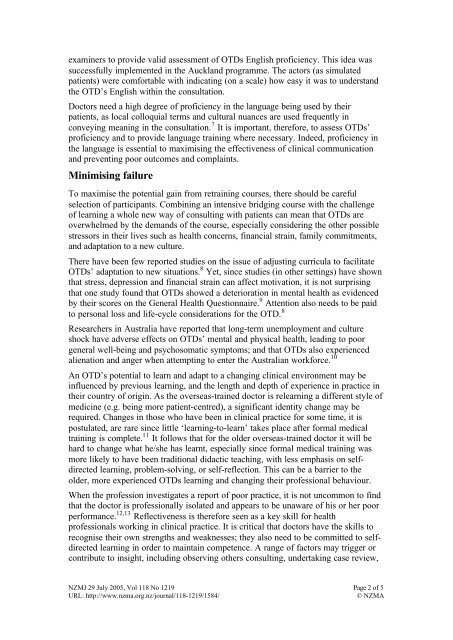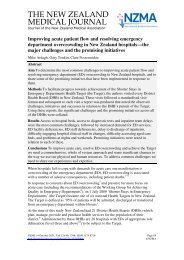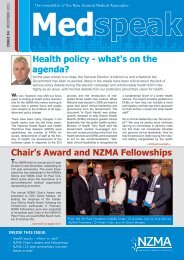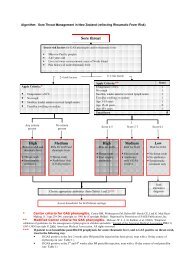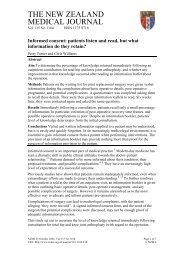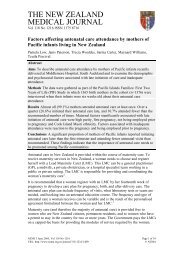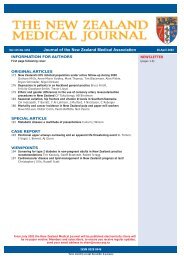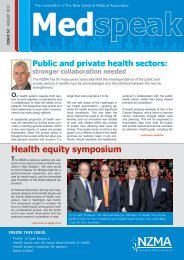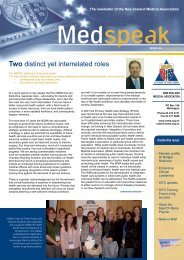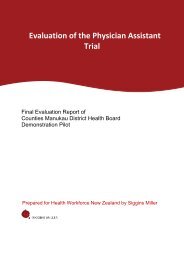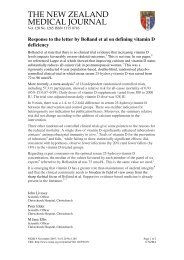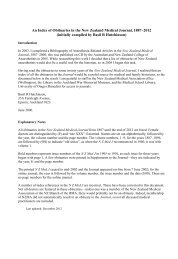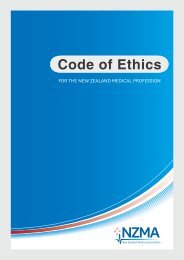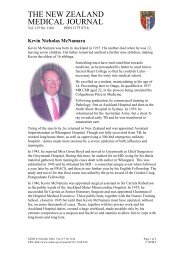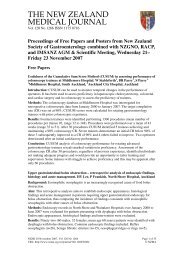THE NEW ZEALAND MEDICAL JOURNAL
THE NEW ZEALAND MEDICAL JOURNAL
THE NEW ZEALAND MEDICAL JOURNAL
Create successful ePaper yourself
Turn your PDF publications into a flip-book with our unique Google optimized e-Paper software.
examiners to provide valid assessment of OTDs English proficiency. This idea was<br />
successfully implemented in the Auckland programme. The actors (as simulated<br />
patients) were comfortable with indicating (on a scale) how easy it was to understand<br />
the OTD’s English within the consultation.<br />
Doctors need a high degree of proficiency in the language being used by their<br />
patients, as local colloquial terms and cultural nuances are used frequently in<br />
conveying meaning in the consultation. 7 It is important, therefore, to assess OTDs’<br />
proficiency and to provide language training where necessary. Indeed, proficiency in<br />
the language is essential to maximising the effectiveness of clinical communication<br />
and preventing poor outcomes and complaints.<br />
Minimising failure<br />
To maximise the potential gain from retraining courses, there should be careful<br />
selection of participants. Combining an intensive bridging course with the challenge<br />
of learning a whole new way of consulting with patients can mean that OTDs are<br />
overwhelmed by the demands of the course, especially considering the other possible<br />
stressors in their lives such as health concerns, financial strain, family commitments,<br />
and adaptation to a new culture.<br />
There have been few reported studies on the issue of adjusting curricula to facilitate<br />
OTDs’ adaptation to new situations. 8 Yet, since studies (in other settings) have shown<br />
that stress, depression and financial strain can affect motivation, it is not surprising<br />
that one study found that OTDs showed a deterioration in mental health as evidenced<br />
by their scores on the General Health Questionnaire. 9 Attention also needs to be paid<br />
to personal loss and life-cycle considerations for the OTD. 8<br />
Researchers in Australia have reported that long-term unemployment and culture<br />
shock have adverse effects on OTDs’ mental and physical health, leading to poor<br />
general well-being and psychosomatic symptoms; and that OTDs also experienced<br />
alienation and anger when attempting to enter the Australian workforce. 10<br />
An OTD’s potential to learn and adapt to a changing clinical environment may be<br />
influenced by previous learning, and the length and depth of experience in practice in<br />
their country of origin. As the overseas-trained doctor is relearning a different style of<br />
medicine (e.g. being more patient-centred), a significant identity change may be<br />
required. Changes in those who have been in clinical practice for some time, it is<br />
postulated, are rare since little ‘learning-to-learn’ takes place after formal medical<br />
training is complete. 11 It follows that for the older overseas-trained doctor it will be<br />
hard to change what he/she has learnt, especially since formal medical training was<br />
more likely to have been traditional didactic teaching, with less emphasis on selfdirected<br />
learning, problem-solving, or self-reflection. This can be a barrier to the<br />
older, more experienced OTDs learning and changing their professional behaviour.<br />
When the profession investigates a report of poor practice, it is not uncommon to find<br />
that the doctor is professionally isolated and appears to be unaware of his or her poor<br />
performance. 12,13 Reflectiveness is therefore seen as a key skill for health<br />
professionals working in clinical practice. It is critical that doctors have the skills to<br />
recognise their own strengths and weaknesses; they also need to be committed to selfdirected<br />
learning in order to maintain competence. A range of factors may trigger or<br />
contribute to insight, including observing others consulting, undertaking case review,<br />
NZMJ 29 July 2005, Vol 118 No 1219 Page 2 of 5<br />
URL: http://www.nzma.org.nz/journal/118-1219/1584/<br />
© NZMA


